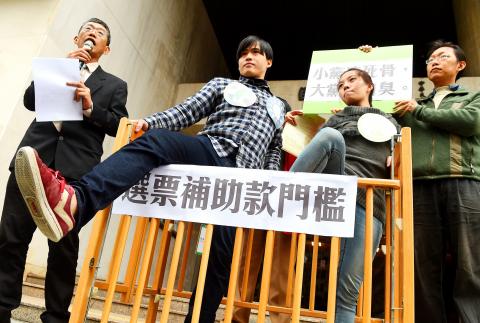A coalition of small political parties and social activist groups yesterday congregated in front of the Legislative Yuan to urge that the threshold for parties to receive Central Election Commission subsidies be lowered, to ensure a fairer distribution of resources among all parties.
Citing as an example the previous legislative election in 2012, Tree Party Chairman Pan Han-chiang (潘翰疆) said the government issues a subsidy of about NT$616 million (US$19.3 million) annually for legislators-at-large, of which major political parties, such as the Chinese Nationalist Party (KMT) and Democratic Progressive Party (DPP), are given a combined total of more than NT$520 million.
Under the existing system, political parties that receive more than 5 percent of the total votes get a NT$50 subsidy per vote; the subsidies are issued every year over the four-year legislator-at-large term.

Photo: Chien Jung-Fong, Taipei Times
Pan urged that Article 43 of the Civil Servants Election and Recall Act (公職人員選舉罷免法), which stipulates the 5 percent threshold, be amended to lower the threshold to at least 1 percent, and that a cap be imposed on the amount of subsidies a political party can receive.
If the threshold is lowered to 1 percent, it would only increase government expenditure for the subsidies by about NT$30 million, Pan said.
“If it can be lowered to 0.5 percent, the government will only need to spend an additional NT$40 million. It is really not too much to ask, but it will greatly benefit smaller political parties’ operations,” he said.
Tree Party co-chair Lin Chia-yu (林佳諭) highlighted the disparity in funding between large political parties and their smaller counterparts, saying that the campaign funds spent by all 16 candidates nominated by her party in the November elections amounted to less than half of what a KMT or DPP Taipei councilor candidate spent.
By lowering the subsidy threshold, visionary young people would have a better chance of being elected into the legislature to push for reform, she said.
Youth Occupy Politics cofounder Shan Yi-che (冼義哲) used Germany as an example, saying that it has since 1969 lowered the threshold for subsidies to political parties to 0.5 percent of the total party votes, which granted the Piratenpartei (Pirate Party) — a young political party formed in 2006 — enough resources to land 15 seats (9.7 percent of the total floor seats) in the Berlin City Council in 2011.
Yesterday’s rallying groups later set up a crib in front of the legislature building to represent the subsidy threshold and acted out skits to satirize the current system, which they said widens the wealth gap between political parties and produces an even more disproportionate ratio of legislative floor seats.

The manufacture of the remaining 28 M1A2T Abrams tanks Taiwan purchased from the US has recently been completed, and they are expected to be delivered within the next one to two months, a source said yesterday. The Ministry of National Defense is arranging cargo ships to transport the tanks to Taiwan as soon as possible, said the source, who is familiar with the matter. The estimated arrival time ranges from late this month to early next month, the source said. The 28 Abrams tanks make up the third and final batch of a total of 108 tanks, valued at about NT$40.5 billion

A group from the Taiwanese Designers in Australia association yesterday represented Taiwan at the Midsumma Pride March in Melbourne. The march, held in the St. Kilda suburb, is the city’s largest LGBTQIA+ parade and the flagship event of the annual Midsumma Festival. It attracted more than 45,000 spectators who supported the 400 groups and 10,000 marchers that participated this year, the association said. Taiwanese Designers said they organized a team to march for Taiwan this year, joining politicians, government agencies, professionals and community organizations in showing support for LGBTQIA+ people and diverse communities. As the first country in Asia to legalize same-sex

Travel agencies in Taiwan are working to secure alternative flights for travelers bound for New Zealand for the Lunar New Year holiday, as Air New Zealand workers are set to strike next week. The airline said that it has confirmed that the planned industrial action by its international wide-body cabin crew would go ahead on Thursday and Friday next week. While the Auckland-based carrier pledged to take reasonable measures to mitigate the impact of the workers’ strike, an Air New Zealand flight arriving at Taipei from Auckland on Thursday and another flight departing from Taipei for Auckland on Saturday would have to

MOTIVES QUESTIONED The PLA considers Xi’s policies toward Taiwan to be driven by personal considerations rather than military assessment, the Epoch Times reports Chinese President Xi Jinping’s (習近平) latest purge of the Chinese People’s Liberation Army (PLA) leadership might have been prompted by the military’s opposition to plans of invading Taiwan, the Epoch Times said. The Chinese military opposes waging war against Taiwan by a large consensus, putting it at odds with Xi’s vision, the Falun Gong-affiliated daily said in a report on Thursday, citing anonymous sources with insight into the PLA’s inner workings. The opposition is not the opinion of a few generals, but a widely shared view among the PLA cadre, the Epoch Times cited them as saying. “Chinese forces know full well that